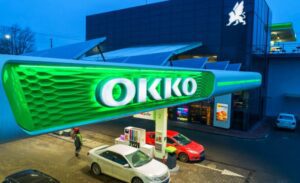
Ukrainian networks of filling stations have managed to master the European market of motor fuel after losing Russian and Belarusian fuel with the beginning of full-scale invasion of Russia thanks to the offer of competitive prices and fast contracts, Vasyl Danilyak, СЕО of OKKO group, said.
“Ukrainian companies did not enter their supply market, where everything was contracted a long time ago. Accordingly, they could outbid on price and fast contracts. Despite the unacceptable price, we started contracting 100 percent of possible resources in all corners of Europe,” he said at the Kiev International Economic Forum on Thursday.
At the same time, Danylyak noted that such decisions were made, among other things, emotionally, although they were not always economically justified.
He explained that the European chain of deliveries is much longer than the ones from the East and North directions, when “pipe deliveries were 3-4 days, by rail from the nearest Belarusian refineries to the average tank farm, the fuel took seven days at most.
“And in Europe the chain could stretch for two months or more. For example, we bought in the region of Amsterdam-Antwerp a fairly expensive resource. Supply logistics are complicated: first by small (because of the low level of the Rhine) barges to Germany, then it pours into big terminals, and then you wait for shipping windows because there are queues. So, in the middle of April we made an advance payment, and the last shipment arrived, if I’m not mistaken, in October,” Danilyak described the situation.
He noted, however, that even if the company had known in advance how difficult the delivery would be, it would still likely have made the contract.
“There was such a shortage that the decision was obvious. The fact that it would not be very profitable was not thought of then,” the CEO of “OKKO” assured.
He also stressed that changing the logistics of petroleum products as the war began was the biggest challenge not only for OKKO, but for the entire industry.
“It was the biggest challenge in the first month of the war that companies focused on. The whole market was confronted with the fact that on one day all deliveries were zeroed out, everyone fixed their losses at the time of February 24, who had prepayments, to whom the goods had not arrived in large quantities. Accordingly, everyone began to refocus on Western supplies. And in about three months, in June, the consumers felt a significant improvement, and in July everything was as if nothing had happened,” said Danilyak.
In addition, he expressed the opinion that dispersed business has more flexibility in crisis situations.
“Big and in one place is not always a good thing, although perhaps more cost-effective. Our business, where there are a lot of small businesses, has proven to be more resilient to stress than, for example, the steel industry, when the loss of two key businesses took out seventy percent of the business,” he argued his opinion.
In this connection Danilyak marked that “OKKO” would adhere to the policy of diversification in future too, that, in principle, the essence of the company business allows.
He also paid attention that war experience will teach many companies to follow fire safety rules strictly in accordance with all the requirements that “earlier they looked through the fingers” to some extent.

The volume of the motor fuel market, including petrol, diesel fuel liquefied gas, in Ukraine, in 2021 increased by 6%, to 12.22 million tonnes, according to a press release from the A-95 Consulting Group.
According to the group, the growth of the market is dictated by economic activity and de-shadowing of the sector.
“The increase in supplies was the result of not only the growing economic activity, especially in the agricultural sector and road construction, but also comprehensive efforts to combat the illegal market. Part of the volumes were brought out of the “shadow,” but this sector, especially with regard to petrol, still accounts for up to 20% of the market,” Serhiy Kuyun, the director of A-95 Consulting Group, said.
According to A-95, the volume of diesel fuel and motor gasoline markets increased by 7% in 2021, to 7.97 million tonnes and 2.29 million tonnes, respectively. At the same time, the liquefied natural gas market showed negative dynamics for the first time in the last eight years, decreasing by 1% to 1.96 million tonnes.
Last year, in the structure of diesel fuel supplies, the share of imports increased in percentage terms from 84% to 86%. At the same time, the share of Russian diesel fuel decreased from 35% to 25% (2.05 million tonnes against 2.61 million tonnes in 2020), the main reason for which was the cessation of pumping through the PrykarpatZakhidTrans oil product pipeline.
At the same time, 2.89 million tonnes were supplied from Belarus in 2021, which amounted to 36% of the Ukrainian market against 30% of the share of Belarusian supplies in 2020.
A record volume of diesel fuel – 1.2 million tonnes, which is 1.5 times more than in 2020 – entered Ukraine by sea.
In 2021, Ukraine imported 1.28 million tonnes of gasoline, or 56% of the market volume. At the same time, Belarusian refineries supplied up to 1 million tonnes and retained their share in gasoline imports at the level of 2020 – 78%. The Polish concern Orlen increased deliveries by 11% over the year – up to 262,200 tonnes.
Domestic gasoline production in 2021 amounted to 1.01 million tonnes, demonstrating a 3% drop due to malfunctions at the Ukrtatnafta refinery last fall (the plant produced 880,000 tonnes of gasoline for the year).